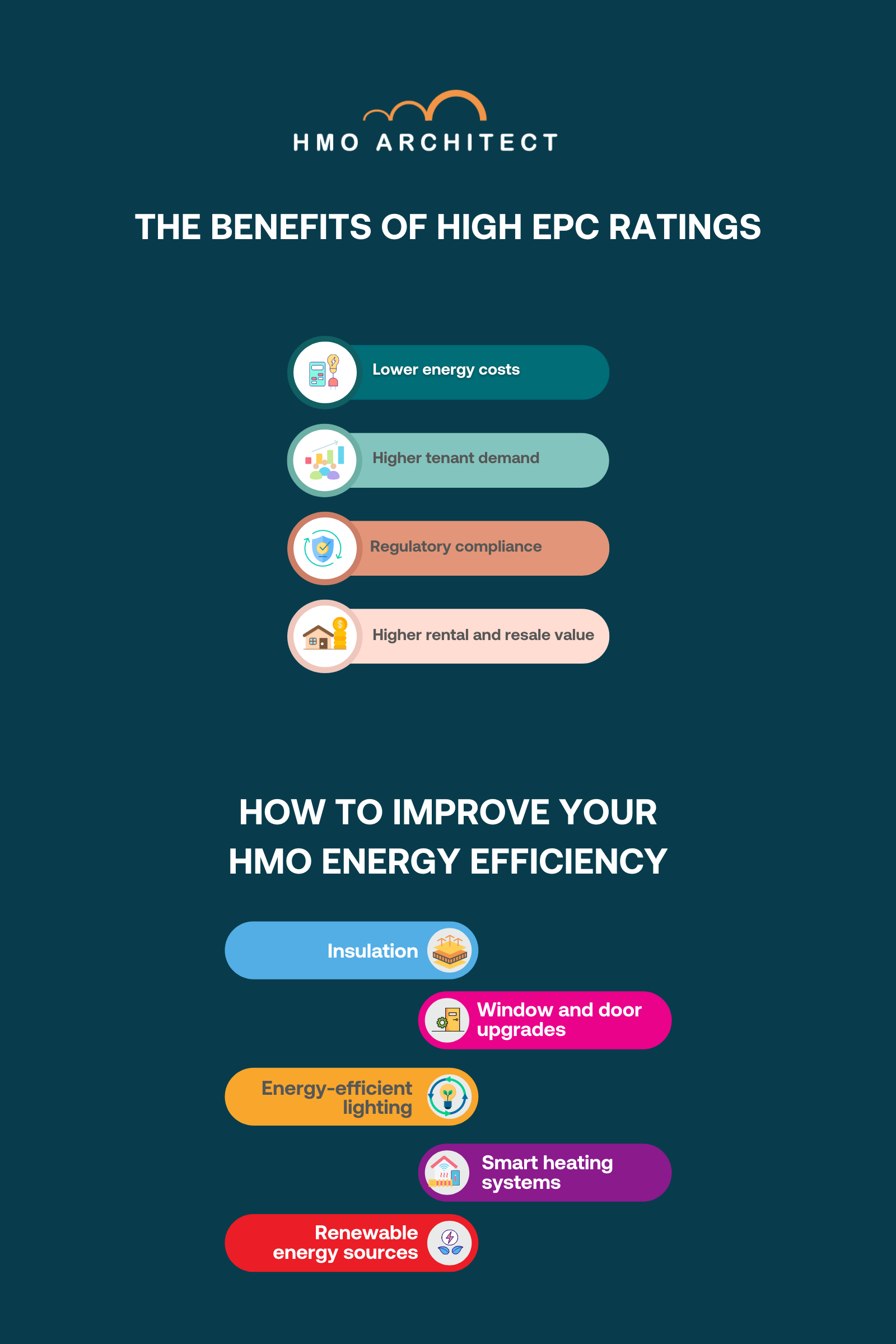
How confident are you that your HMO meets the latest EPC requirements and potential? With housing regulations evolving, staying compliant is more challenging and critical than ever. In this guide, we explore the criteria, benefits and challenges of EPC requirements for Houses in Multiple Occupation, providing actionable insights on how to meet and exceed these standards to reap substantial benefits in energy savings and tenant satisfaction.
HOW DO EPC REQUIREMENTS IMPACT HMO MANAGEMENT?
Houses in Multiple Occupation (HMOs), like other rental properties, including Buy-To-Lets, must obtain a comprehensive assessment to rate the energy efficiency of the property on a scale from A (most efficient) to G (least efficient). This assessment is known as an Energy Performance Certificate (EPC). The EPC offers landlords a picture of how energy-efficient their property is and where improvements can be made. Moreover, in the context of HMO management, an EPC serves in significant ways:
- Transparency: The EPC rating provides relevant and clear information on the property’s energy performance and potential utility costs for tenants.
- Compliance: HMO landlords are legally required to have a valid EPC before they can rent out their property. This ensures that all rental properties meet the minimum energy efficiency standards—projected to intensify as part of the UK’s commitment to reducing carbon emissions.
- Market appeal: Properties with better EPC ratings are often more attractive to prospective tenants concerned about energy costs and environmental impact.
LEGAL EPC REQUIREMENTS FOR HMOS
For HMO landlords, understanding the implications of EPC regulations is essential for compliance. Make sure these EPC requirements form part of your HMO strategy and management:
DO HMOs NEED AN EPC?
- Minimum standards: At present, all HMOs and rental properties (with some exceptions) must have an EPC rating of at least E before they can be rented out. Properties failing to meet this standard can no longer be let or continue to rent.
WHEN IS AN EPC REQUIRED?
- Renting or selling: You must have a valid EPC to show prospective tenants or buyers when renting or selling the property. This requirement allows potential occupants to understand the energy efficiency of the property they are considering.
- New lets: For new tenancies in an HMO, landlords must show an EPC. The EPC is also required when a tenancy is renewed or extended.
- Conversion into an HMO: If a property is being converted into an HMO, it needs a new EPC if it does not already have a valid one. Consider that conversions often involve structural changes that could affect energy performance.
- Significant modifications: If you make significant modifications to your HMO, such as altering the number of bedrooms or the heating, hot water, or air conditioning systems, you may need a new EPC to reflect these changes accurately. For instance, if you install a new heating system or add an extension to the property, a new EPC may be necessary.
- Keeping records: Landlords should keep records of all EPC assessments and renewals. This documentation can be required during property management reviews, tenant disputes, or if requested by regulatory bodies.
HOW OFTEN SHOULD AN EPC BE DONE?
- Regular updates: EPCs are valid for ten years from their issued date. However, periodic assessments may be required for compliance and accuracy. You should seek a new EPC assessment if you have made significant energy efficiency improvements to your property, such as upgrades in the heating system, insulation, or installing double glazing.
- Before expiry: Once an EPC expires, it must be renewed before the property is rented to new tenants. This guarantees that the energy information remains current and valid.
- Risk of non-compliance: Failing to provide a valid EPC or renting out a property with an insufficient EPC rating can have several implications, from delaying the renting process to fines and other penalties.
Get straight answers to your questions about HMOs’ legal restrictions
WHY IT MIGHT BE WORTH GETTING AN EPC ASSESSOR OUT NOW
Although not much has probably changed since you last got your property’s energy efficiency rated under the EPC system, there may be a case for getting one now, even if you’re not due yet.
If you get a new valid EPC, you’ll better understand your property’s energy performance as it is today. This should give you an idea of what work needs to be carried out and what budget you must set aside.
For properties requiring frequent maintenance and receiving numerous complaints from tenants, doing the work now instead of later may save you more in the long run if the property deteriorates further.
EPC RATINGS FROM A TO G
Energy Performance Certificates (EPCs) rate properties from A to G, with A being the most energy-efficient and G the least. This scale is an indicator of the property’s energy consumption and the cost of utilities.
- A Rating (92-100 points): A-rated properties are the peak of energy efficiency. Behind this rate, you’ll likely find modern technologies and building practices that minimise energy waste, lower utility bills and reduce carbon footprint.
- B Rating (81-91 points): These are highly efficient properties but may lack some of the cutting-edge features in A-rated homes.
- C Rating (69-80 points): A common target for HMOs, C ratings offer a good balance of comfort and energy efficiency. Upgrading to this level is often feasible with moderate investments in insulation and heating systems.
- D Rating (55-68 points): D-rated properties have room for improvement. Simple changes like upgrading lighting to LED and sealing leaks can boost ratings.
- E Rating (39-54 points): These properties meet the minimum standards for rental properties as per current regulations but need enhancements to reach higher efficiency levels.
- F and G Rating (1-38 points): These energy-inefficient properties often require significant investment to make them suitable for renting under current laws.
BENEFITS OF HIGHER EPC RATINGS FOR HMOS
Achieving high EPC ratings in HMOs is a strategic advantage that can significantly help your rental business.
- Energy efficiency: High EPC ratings reflect lower energy usage, which is not only good for compliance and the environment but also reduces heating and electricity costs for tenants—a deciding factor for those who are budget-conscious.
- Property value: Properties with better EPC ratings can potentially command higher rents and achieve higher resale values. Investing in energy efficiency solutions can pay off in the long run by increasing the property’s marketability.
- Tenant attraction: As awareness of environmental issues grows, more tenants are looking for properties that show a commitment to sustainability. A high EPC rating can make your HMO stand out in a competitive market, attracting a broader tenant base.
- Regulatory compliance: Higher EPC ratings ensure that the HMO remains compliant as the property rental regulations evolve. Adherence to energy efficiency standards is crucial for HMOs, protecting landlords from potential fines and enforcement actions.

HOW TO IMPROVE YOUR HMO ENERGY EFFICIENCY
While HMOs can have high maintenance costs and improvements can be costly, boosting their EPC rating can be done in ways that don’t necessarily break the bank. There are various design improvements you can implement to increase your HMO’s energy efficiency and overall appeal; these include:
INSULATION
Insulation minimises heat loss and can significantly improve energy efficiency. There are five types of insulation:
- Wall insulation: A professional can tell you whether cavity wall insulation (filling the gap between the two layers of a wall with insulating material) or solid wall insulation (applied externally or internally to the walls) is better for your property.
- Loft insulation: Installing 270mm of insulation in your loft significantly reduces heat loss. Prices vary for standard insulation materials like mineral wool, sheep’s wool, and rigid insulation boards. This is probably the cheapest and fastest way to improve an EPC rating, as it is often easy and quick to install.
- Room-in-room insulation: If you’ve converted the attic for use as a room, you can insulate it by fitting insulation boarding under existing plasterboard walls between the rafters.
- Floor insulation: A less well-known approach involves installing insulating materials beneath the floorboards. Floors may be responsible for up to 10% of heat loss.
- Hot water cylinder insulation: This upgrade offers marginal savings and is only suitable if your HMO has a conventional boiler.
WINDOW AND DOOR UPGRADES
While most HMOs now feature double glazing and uPVC doors, there are still opportunities to improve energy efficiency. Consider these three approaches:
- Triple glazing: Double-glazed window U-value is 1.6, whereas triple-glazing window value is 0.8, a significant difference.
- External doors: Compared with other types of doors, including uPVC, fibreglass doors offer greater energy efficiency because fibreglass is a poor conductor of heat. For optimal energy savings, external doors should be draught-proofed and have airtight seals.
- Internal doors: You can source internal fibreglass doors, too. However, draught excluders are essential for internal doors. Remember that internal doors must also adhere to strict requirements under HMO fire regulations.
Check out our guide on fire testing and maintenance
LIGHTING OPTIONS
Switching to energy-efficient lighting reduces energy consumption, and that’s reflected in your EPC. Here are two effective options to consider:
- LED lighting: LED bulbs are a game-changer, consuming up to 90% less energy than traditional incandescent bulbs. They also last longer, which means fewer replacements and reduced maintenance costs.
- Smart lighting controls: While smart lighting controls, like motion sensor lights, mainly impact the EPC band for commercial properties, they are still a great way to save on electricity bills. You can significantly reduce wasted energy by ensuring lights are only on when needed.
IMPROVING HEATING SYSTEMS
Replacing heating systems in older and larger properties might seem costly upfront, but the investment pays off with significantly better energy efficiency, as modern standards require. Here are three ways to improve energy efficiency through heating systems:
- New boiler: Consider upgrading to an A-rated conventional boiler—these are now available from manufacturers like Worcester Bosch and Viessmann. Modern boilers deliver superior energy efficiency, yet it’s important to note that combi boilers, despite their efficiency, aren’t suitable for HMOs.
- Smart thermostats: You can increase control and efficiency with smart thermostats. Inspire Home Automation has launched smart thermostats designed for landlords. These devices include advanced features tailored for HMO settings, helping landlords manage heating more effectively.
- Radiator upgrades: Modern radiators with thermostatic valves (TRVs) distribute heat better and offer more precise temperature control. These radiators can deliver consistent warmth and allow for different heating settings in each room.
RENEWABLE ENERGY SOURCE OPTIONS
EPC assessors take into account the primary sources of heating and electricity when determining the rating of an HMO. Improving your EPC rating through renewable energy solutions can be done in different ways:
- Solar panels: You can significantly reduce your property’s energy costs and carbon footprint by harnessing the sun’s energy. Installing solar panels will allow you to save on energy bills and boost your EPC rating.
- Solar thermal systems: These systems focus on providing hot water, not electricity. They score well on EPC assessments because they can generate 50-60% of the hot water needed annually.
- Biomass boilers: Using biomass boilers can lower energy consumption, improving EPC ratings. They burn organic materials like wood pellets or chips.
- Heat pumps: The effectiveness of heat pumps in the UK’s climate is still a topic of debate. The worry is that Britain’s climate is not suitable to get the maximum benefit from them. So, while they offer potential benefits, relying on more proven technologies like solar panels might be wise, especially if you’re looking for reliable and efficient solutions.
As part of your strategy to maximise your HMO performance, when planning these improvements, it’s important to consider the return on investment in terms of energy savings, tenant satisfaction, and the potential increase in property value. Engaging with a professional energy assessor can provide tailored advice, ensuring that the chosen renovations align with your budget and your goals for property improvement.
THE EXCEPTIONS: WHEN IS AN EPC NOT REQUIRED?
An EPC is generally required whenever a property is built, sold or rented. However, there are specific circumstances where an EPC may not be enforced. These exemptions only cover you if you have an HMO with an EPC band rating of ‘F’ or ‘G’ where you can’t simply improve the property to achieve an E-rating.
The specific exemptions are:
- High cost/affordability exemption: If the cost of implementing the cheapest recommended improvements for a property is more than £3,500 (inc. VAT), you can get an exemption. You need to provide three quotes from different installers to support your claim. Your exemption is valid for 5 years. Once it expires, you can apply for another 5-year extension if you cannot complete the improvements within the £3,500 limit.
- All improvements made: This exemption applies where you have made all possible improvements to achieve an EPC E rating, and your property still falls short. The exemption is valid for 5 years, which you can again extend by another five years if the situation doesn’t change. If the details supporting your exemption are not included in the EPC, you must submit the relevant documentation along with your application.
- Wall insulation: Regulation 24(2) acknowledges that certain wall insulation systems may not be suitable for every property. If that applies to your HMO, you must present written expert advice confirming that insulation would adversely affect the property’s structure or fabric. This situation often occurs with listed buildings or properties protected by the Heritage Department.
- Consent: When you need legal third-party consent for energy efficiency improvements, and consent was either refused or subject to an unreasonable condition, you can apply for an exemption. As with other exemptions, this lasts for five years and is subject to renewal.
- Devaluation: If you have a report from an independent RICS surveyor advising that installing specific energy efficiency measures would reduce the property’s market value by more than five per cent, you can apply for an exemption. You need to include this report with your application. Similarly, this exception is valid for five years and is subject to renewal.
- New Landlord: If you become a landlord and are subject to one of six circumstances set out by the regulations, you can get a temporary exemption from compliance for 6 months after you become the landlord.
UPCOMING HMO ENERGY REQUIREMENTS
As part of its net-zero target, the government wants to reduce energy consumption from domestic properties. Landlords, including HMO landlords, are among the many targeted by these goals. While the particulars are still to be clarified, the government has confirmed its intention to put the minimum EPC rating of ‘C’ back on the table.
Once in force, all rented properties will be required to have an EPC rating of C or higher. Failure to comply with the new regulations would result in financial penalties. At the time of writing, the Minimum Energy Performance of Buildings (No. 2) Bill is not yet law. However, given the government’s commitment to net zero, we think the chances are that it will become law.
WHAT’S NEXT FOR EPC HMO REQUIREMENTS?
You might think you’ll be OK if you do all the work required to comply with the current standards. We’d love to be able to offer you that comfort. However, proposed changes and deadlines have moved on more than one occasion. It wouldn’t surprise us if the rules evolved beyond the imminent updates and rental properties, including HMOs, require a minimum ‘B’ rating in ten years. We hope the government will introduce a financial support package to landlords to help them achieve the necessary results for the EPC register.
We advise HMO landlords on the upgrades they can use to upgrade their property to receive an EPC ‘C’ rating. Don’t hesitate to contact us to learn more about HMO Architects and our HMO-focused design consultation service.
Join our exclusive webinars to boost your HMO knowledge and gain insights into the latest regulations, and the strategies to master effective management strategies.
Giovanni is a highly accomplished architect hailing from Siena, Italy. With an impressive career spanning multiple countries, he has gained extensive experience as a Lead Architect at Foster + Partners, where he worked on a number of iconic Apple stores, including the prestigious Champs-Élysées flagship Apple store in Paris. As the co-founder and principal architect of WindsorPatania Architects, Giovanni has leveraged his extensive experience to spearhead a range of innovative projects.




